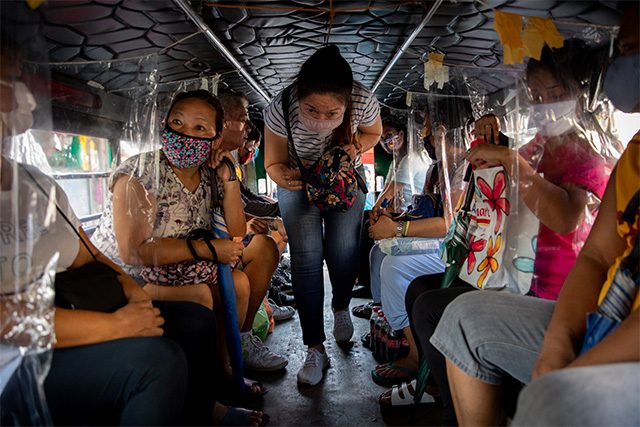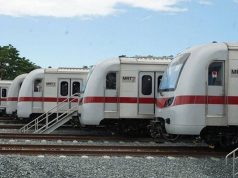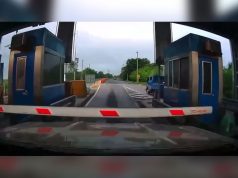
The P2,000 penalty slapped on jeepney drivers with passengers caught violating the face shield policy was criticized as being too costly amid the economic crisis and the pandemic.
Some Filipinos addressed their complaints in a tweet by ABS-CBN News last Monday, February 15.
In the report, a member of the Inter-Agency Council for Traffic caught passengers of a traditional jeepney who were not wearing face shields. Instead of asking the driver to pay, the enforcer only gave them a warning for the violation.
This incident was compared to the P1,500 penalty some celebrities previously paid over breaking minimum health protocols at a birthday party in Baguio City.
Pasig City Transport officer Anthony Siy said that the punishment is an added burden to both the jeepney driver and passengers.
“He will pay a higher fine than people who partied in Baguio without masks. This will wipe out his earnings for the day, and his passengers’ wages will be docked when they are late for work,” Siy said.
“For face shields. On a jeepney with perfect ventilation,” he added.
He will pay a higher fine than people who partied in Baguio without masks. This will wipe out his earnings for the day, and his passengers' wages will be docked when they are late for work.
For face shields. On a jeepney with perfect ventilation. What a stupid waste of time. https://t.co/t6KYENah5v
— anton playing 2020: Nightmare Difficulty (@anthony_siy) February 15, 2021
Forensic pathologist Raquel Fortun noted that drivers are already multitasking and still have to check these violations while also driving.
Poor multitasking PUJ driver must now also check face shields https://t.co/UL0CQyykVa
— Raquel Fortun (@Doc4Dead) February 15, 2021
Journalist Barnaby Lo also criticized the rule wherein Public Utility Vehicle drivers are at fault for the passengers’ offenses.
1. Why is it the driver’s fault?
2.P2,000 fine for a jeepeney driver while the rich and famous who party get slapped with only P1,500?
3. Still don’t understand the rationale for requiring face shields especially in a space that’s ventilated. https://t.co/PEgiFbRiBj
— Barnaby Lo (@barnabychuck) February 15, 2021
Dr. Gene Nisperos, assistant professor at the University of the Philippines College of Medicine echoed this view, saying that such policy is anti-poor.
“Ang kaya lang talagang apihin ng gobyernong ito ay yung mga mahihirap,” Nisperos said.
Other Twitter users similarly renewed their ire against the face shield policy, which effectivity against the virus had never been proven in science.
“The government really hates the poor. We don’t even know if wearing face shields really makes sense. Philippines is the only country in the world that mandates face shields yet we are one of the countries with highest infection rates,” one user said.
Context on natural ventilation
The World Health Organization recommended improving proper ventilation in indoor public spaces as part of the preventive measures against the spread of the virus which causes COVID-19.
“Ventilation is the intentional introduction of fresh air into a space while the stale air is removed. It is done to maintain the quality of air in that space,” the WHO said.
Another study also stated that the increase of ventilation reduces the risk of transmission by 97% given that COVID-19 is airborne.
An update on face masks
Since August of last year, the Department of Transportation and other related agencies required face masks and face shields to be worn by passengers using public transport at all times. Commuters should also wear face masks and shields when traveling outside.
The Land Transportation Office later required face masks to be worn inside private vehicles as well even if the passengers came from the same household.
READ: Why some Filipinos are opposing LTO’s face mask policy inside vehicles
Violators will be fined P2,000 for private vehicles and a higher fee P5,000 for public vehicles over reckless driving, LTO said.
However, due to criticisms from the public, LTO chief Assistant Secretary Edgar Galvante in a briefing this month said that that traffic enforcers will only flag motorists and no penalties will be imposed in the meantime.
“Pero pansamantala, kung kayo ay masisita hindi naman kayo pagmumultahin or whatever. Ipapaliwanag iyong kahalagahan iyong paguutos na kailangan nakasuot ang face mask,” Galvante said.
In another statement on February 5, the DOTr and the Department of Health stated the new guidelines for wearing face masks inside vehicles. These are:
- When traveling alone, the driver may remove his/her face mask; and
- When the driver is with passenger/s, it is mandatory for all individuals inside the vehicle to properly wear a face mask, regardless if they are from the same household.









